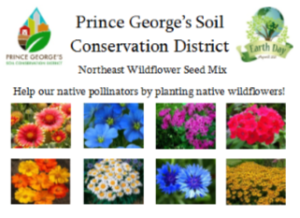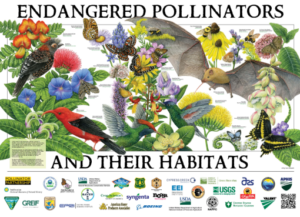This article is featured in our 2019 Annual Report.
2019 was a great year for seed packet distribution! Staff provided packets for various community events, local businesses, and the general public. Our seed packets contain a variety of seeds for native flowering plants that can be used in gardens and yards.
According to the U.S. Fish and Wildlife Service, animals visit flowers in search of food and sometimes even mates, shelter and nest-building materials. Some animals, such as many bees, intentionally collect pollen, while others, such as many butterflies and birds, move pollen incidentally because the pollen sticks on their body while they are collecting nectar from the flowers. All of these animals are considered pollinators.
Pollinators, such as most bees and some birds, bats, and other insects, play a crucial role in flowering plant reproduction and in the production of most fruits and vegetables.
Examples of crops that are pollinated include apples, squash, and almonds. Without the assistance of pollinators, most plants cannot produce fruits and seeds. The fruits and seeds of flowering plants are an important food source for people and wildlife. Some of the seeds that are not eaten will eventually produce new plants, helping to maintain the plant population.

For Earth Day events in 2019, we provided seed packets to: Prince George’s County Employees Childcare Center, Upper Marlboro Community Center (UMCC), The Soul Factory, Prince George’s Community College—Academy of Health Sciences, various workshops through the University of Maryland Extension, Kettering Middle School, and at our Annual Cooperator Dinner.
Additional seed packets were made available to the public at each of our office locations in Upper Marlboro and Largo. The packets were also distributed at a Prince George’s County Community Conversation at Wise High school and through our SYEP students at the Chesapeake Bay Foundation Clagett Farm.
In total, we distributed over 500 seed packets!

